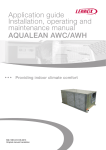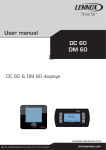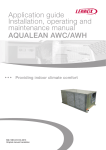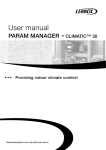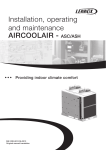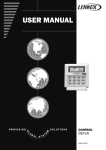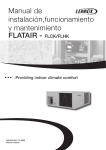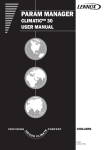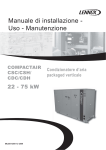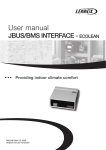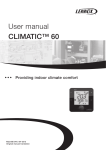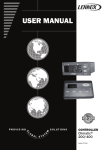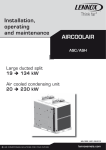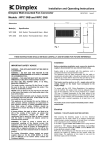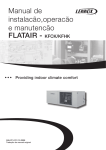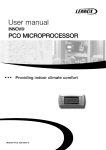Download flatair2_iom_mil115e-1011 10-2011
Transcript
Installation, operating and maintenance FLATAIR R410A FMC-H/ FIC-H/ FSC-H Providing indoor climate comfort MIL115E-1011 10-2011 Original manual translation WARNING: Read this manual before installation, reparation o maintenance works. TABLE OF CONTENTS POINTS TO BEAR IN MIND PAGE 2 DATA PAGE FOR COMMISSIONING UNIT PAGE 3 1.- GENERAL CHARACTERISTICS PAGE 4 4-5 5 6 7-8 9-14 15 1.1.- PHYSICAL DATA 1.2.- ELECTRICAL DATA 1.3.- OPERATING LIMITS 1.4.- FAN PERFORMANCES 1.5.- PIPING DRAWINGS 1.6.- UNIT DIMENSIONS 1.7.- DUCT POSITION 2.- INSTALLATION 2.1.- PRELIMINARY PREPARATIONS 2.2.- UNIT ACCEPTANCE 2.3.- OPTIONAL OPERATIONS PRIOR TO UNIT INSTALATION 2.4.- UNIT LOCATION 2.5.- INSTALLATION CLEARANCES 2.6.- DRAINS 2.7.- REFRIGERANT CONNECTIONS 2.8.- ELECTRICAL CONNECTIONS 3.- COMMISSIONING AND OPERATION 3.1.- PRELIMINARY CHECKS 3.2.- PRELIMINARY CHECKS AT FIRST INSTALLATION PAGE 16 16 18 18 18 19-20 21 PAGE 22 22-23 4.- MAINTENANCE PAGE 24 24-25 26 27 4.1.- PREVENTIVE MAINTENANCE 4.2.- CORRECTIVE MAINTENANCE 4.3.- FAILURE DIAGNOSIS 4.4.- REGULATION Lennox have been providing environmental solutions since 1895, our COMPACTAIR range continues to meet the standards that have made LENNOX a household name. Flexible design solutions to meet YOUR needs and uncompromising attention to detail. Engineered to last, simple to maintain and Quality that comes as standard. For information on local contacts at www.lennoxeurope.com. All the technical and technological information contained in this manual, including any drawing and technical descriptions provided by us, remain the property of Lennox and must not be used (except in the operation of this product), reproduced, issued to or made available to third parties without the prior written agreement of Lennox. POINTS TO BEAR IN MIND DANGER AND WARNING SIGNS Abrasive surfaces Low temperatures High temperatures Risk of injury by moving objects Electrical voltage Risk of injury by rotating objects ELECTRICAL CONNECTIONS Make sure to switch off the power before installing, repairing or carrying out maintenance on the unit, in order to prevent serious electrical injury. Keep local and national legislation in mind when installing the unit. Standard Guidelines to Lennox equipment All technical data contained in these operating instructions, including the diagrams and technical description remains the property of Lennox and may not be used (except for the purpose of familiarizing the user with the equipment), reproduced, photocopied, transferred or transmitted to third parties without prior written authorization from Lennox. The data published in the operating instructions is based on the latest information available. We reserve the right to make modifications without notice. We reserve the right to modify our products without notice without obligation to modify previously supplied goods. These operating instructions contain useful and important information for the smooth operation and maintenance of your equipment. The instructions also include guidelines on how to avoid accidents and serious damage before commissioning the equipment and during its operation and how to ensure smooth and fault-free operation. Read the operating instructions carefully before starting the equipment, familiarize yourself with the equipment and handling of the installation and carefully follow the instructions. It is very important to be properly trained in handling the equipment. These operating instructions must be kept in a safe place near the equipment. Like most equipment, the unit requires regular maintenance. This section concerns maintenance and management personnel. If you have any queries or would like to receive further information on any aspect relating to your equipment, do not hesitate to contact us. DATA PAGE FOR UNIT COMMISSIONING UNIT: SERIAL Nr: CONTROL PANEL IDENTIFICATION CODE: INSTALLATION ADDRESS: INSTALLER: INSTALLER TEL: INSTALLER ADDRESS: DATE OF COMMISSIONING: CHECKS: SUPPLY VOLTAGE: RATED VOLTAGE OF THE UNIT: YES NO UNIT ON SHOCK ABSORBERS DRAINAGE WITH TRAP MAIN POWER SUPPLY CONNECTION CONTROL PANEL CONNECTION COMPRESSOR OIL LEVEL INDICATOR DATA INPUT: COOLING CYCLE Air intake temperature to the outdoor coil: Air output temperature to the outdoor coil: HEATING CYCLE 1 2 1 2 ºC ºC ºC ºC Air intake temperature to the outdoor coil: Air output temperature to the outdoor coil: High pressure: circuit 1 circuit 2 High pressure: circuit 1 circuit 2 Low pressure: circuit 1 circuit 2 Low pressure: circuit 1 circuit 2 ELECTRIC POWER CONSUMPTION (Amps) Compressor 1 Compressor 3 Outdoor fan section 1 Compressor 1 Compressor 2 Compressor 3 Outdoor fan section 1 Outdoor fan section 2 Outdoor fan section 2 Options installed: Comments: Compressor 2 1 2 1 2 ºC ºC ºC ºC 1.- GENERAL CHARACTERISTICS 1.1.- PHYSICAL DATA F M C 015 S N C: Cooling only S: One Circuit H: Heat pump X: Cooling only / Heat pump M: Compact unit Approximate cooling S: Outdoor unit capacity in kW I: Indoor unit M Unit FLATAIR 1 M Type of refrigerant M: R-410A --- M: 400V/3/50 Number of revision FMC: Cooling only unit R-410A. FMH: Heat pump unit R-410A. WEIGHTS OF THE UNITS AND OPTIONS MODELS 010 012 015 020 025 030 Cooling only FMC 170 174 250 268 322 338 Heat pump FMH 175 179 255 273 327 343 Package unit Outdoor unit Net weight Kg. Cooling only FSC 112 116 165 159 202 208 Heat pump FSH 117 121 170 164 207 213 Cooling only FIC 58 58 85 109 121 131 Heat pump FIH 58 58 85 109 121 131 Free-cooling 1 damper 12 12 12 14 15 15 Free-cooling 2 dampers 24 24 24 28 30 30 Electrical heater 7 7 7 7 8 8 Indoor unit Opcions 1.2.- ELECTRICAL DATA ELECTRICAL CONSUMPTION UNIT PACKAGE UNIT (INDOOR+ OUTDOOR) INDOOR UNIT OUTDOOR UNIT 10 230V I 10 12 15 20 25 30 Maximum power (KW) 5,5 5,3 6,6 7,8 10,4 12,6 14,2 Maximum current (A) 31,7 13,7 16,0 18,6 23,6 30,0 31,0 Starting current (A) 90,2 34,1 39,7 49,0 75,3 82,3 86,9 Maximum power (KW) 0,4 0,4 0,4 0,8 1,0 1,3 1,3 Maximum current (A) 2,6 2,6 2,6 2,8 4,3 4,3 4,3 Starting current (A) 1,7 1,7 1,7 1,8 2,8 2,8 2,8 Maximum power (KW) 5,1 4,9 6,1 7,0 9,4 11,3 13,0 Maximum current (A) 29,1 11,1 13,4 15,8 19,3 25,7 26,7 Starting current (A) 87,6 31,5 37,1 46,2 71,0 78,0 82,6 1.- GENERAL CHARACTERISTICS 1.2 .- ELECTRICAL DATA Electrical consumptions to add to the unit indoor and to the set 10 230V I 10 Standard 3 3 4,5 7,5 Medium 6 6 6 9 9 9 12 Standard 13,0 7,5 11,3 18,8 Medium 26,1 15 15 22,5 High - 22,5 22,5 30 ELECTRICAL HEATER Maximum power (KW) High Maximum current (A) 12 15 20 25 30 1.3.- OPERANTING LIMITS OPERATING LIMITS (COOLING ONLY) MAXIMUM TEMPERATURES MINIMUM TEMPERATURES 32ºC BS / 23ºC BH 21ºC BS / 15ºC BH Table 1 +15ºC UNIDAD ESTÁNDAR 0ºC (*) -15ºC (**) INDOOR TEMPERATURE COOLING CYCLE OPERATION OUTDOOR TEMPERATURE (*) With option kit low temperature 0ºC. (**) With option kit low temperature -15ºC. OPERATING LIMITS MAXIMUM TEMPERATURES MINIMUM TEMPERATURES 32ºC BS / 23ºC BH 21ºC BS / 15ºC BH Table 1 +15ºC STANDARD UNIT 0ºC (*) -15ºC (**) 27ºC BS 15ºC BS 25ºC (With 20º indoor temperature. Models 10-15-20-30) 23ºC (With 20º indoor temperature. Models 12-25) -12ºC (HEAT PUMP) COOLING CYCLE OPERATION HEATING CYCLE OPERATION INDOOR TEMPERATURE OUTDOOR TEMPERATURE INDOOR TEMPERATURE OUTDOOR TEMPERATURE DB: Dry bulb temterature WB: Wet bulb temperature (*) Active CL40 parmeter to operate at 0º (**) With option kit low temperature -15ºC. Table 1 10 12 15 20 25 30 Maximum outdoor temperature 45 43 45 44 44 41 1.- GENERAL CHARACTERISTICS 1.4.- FAN PERFORMANCES INDOOR UNITS Airflow (m3/h) Available static pressure (Pa) UNITS 10 12 15 20 25 30 0 2350 2300 3575 4850 5750 5500 10 2275 2250 3495 4785 5730 5455 20 2240 2200 3410 4715 5705 5405 30 2190 2150 3330 4645 5670 5350 40 2140 2100 3250 4575 5630 5285 50 2080 2040 3170 4500 5580 5220 60 2025 1975 3095 4425 5530 5140 70 1975 1925 3020 4345 5470 5060 80 1925 1860 2945 4260 5405 4965 90 1840 1800 2875 4175 5330 4870 100 1775 1730 2800 4090 5250 4765 110 1625 1650 2735 4000 5165 4655 120 1500 2665 3910 5075 4540 130 2600 3815 4975 4415 140 2535 3720 4870 4285 150 2470 3620 4755 4150 160 2410 3520 4640 4005 170 3415 4515 3855 180 3310 4380 3695 190 3200 4245 200 3090 4100 210 3945 220 3790 230 3625 240 3455 OUTDOOR UNITS Airflow (m3/h) Available static pressure (Pa) UNITS 10 12 15 20 25 30 0 3500 3400 4500 5650 6000 5850 10 3410 3325 4460 5550 5920 5755 20 3300 3160 4410 5450 5840 5665 30 3190 3075 4360 5350 5760 5575 40 3080 2980 4310 5250 5680 5485 50 2970 2890 4250 5150 5600 5400 60 2840 2790 4190 5050 5520 5315 70 2700 2690 4125 4945 5445 5235 80 2560 2580 4055 4840 5365 5155 90 2410 2400 3980 4735 5290 5075 100 2350 5000 3905 4630 5210 110 3825 4525 5135 120 3740 4420 5060 130 4315 4985 140 4205 4910 150 4095 4835 160 4760 Nominal airflow 1.- GENERAL CHARACTERISTICS COOLING ONLY UNITS 10-12-15 1.8.- PIPING DRAWINGS INDOOR UNIT OUTDOOR UNIT Fan motor Scroll compressor LP HP PT Fan CH IS Coil Coil Orifice OS OPTION ELEMENT HEAT PUMP UNITS 10-12-15 INDOOR UNIT OUTDOOR UNIT Fan motor LP Scroll compressor HP 4-way valve PT Fan IS Coil Coil Suction Acumulator Orifice Filter drier Orifice OS Pressure gauge. (5/16” to be fitted by the installer). CH Crank case heater. (Low ambient 0ºC or -15ºC option for cooling only units). IS Liquid-gas pipe sensor PT Pressure transducer (Low ambient 0ºC or -15ºC option for cooling only units). LP Low pressure switch OS Outdoor temperature sensor HP High pressure switch 1.- GENERAL CHARACTERISTICS HEAT PUMP UNITS 20-25-30 1.8.- PIPING DRAWINGS OUTDOOR UNIT INDOOR UNIT Fan motor Scroll compressor LP HP PT Fan CH IS Coil Coil OS Expansion valve Filter drier (ELEMENTO OPCIONAL) OPTION ELEMENT HEAT PUMP UNITS 20-25-30 OUTDOOR UNIT INDOOR UNIT Fan motor Fan LP Scroll compressor HP 4-way valve PT Fan IS Coil Coil Suction Acumulator Scroll compressor OS Expansion valve Filter drier Filter drier Expansion valve Check valve Check valve Pressure gauge. (5/16” to be fitted by the installer). CH IS Liquid-gas pipe sensor. PT LP Low pressure switch. OS HP High pressure switch. Crank case heater. (Low ambient 0ºC or -15ºC option for cooling only units). Pressure transducer, circuit 1.(Low ambient 0ºC or -15ºC option for cooling only units). Outdoor temperature sensor 1.- GENERAL CHARACTERISTICS 1.5.- UNIT DIMENSIONS FIX 10-12 FSC / FSH 10-12 1.- GENERAL CHARACTERISTICS 1.5.- UNIT DIMENSIONS FIX 15 FSC / FSH 15 10 1.- GENERAL CHARACTERISTICS 1.5.- UNIT DIMENSIONS FIC / FIH 20 FSC / FSH 20 11 1.- GENERAL CHARACTERISTICS 1.5.- UNIT DIMENSIONS FIC / FIH 25-30 FSC / FSH 25-30 12 1.- GENERAL CHARACTERISTICS 1.5.- UNIT DIMENSIONS FMC/FMH 10-12 FMC/FMH 15 13 1.- GENERAL CHARACTERISTICS 1.5.- UNIT DIMENSIONS FMC/FMH 20 FMC/FMH 25-30 14 1.- GENERAL CHARACTERISTICS 1.5.- DUCT POSITION MODELS 10-12-15 SPLIT UNIT PACKAGE UNIT OUTDOOR FAN OUTDOOR FAN INDOOR FAN INDOOR FAN E.H. E.H. O O UT IL R CO IL COMPRESSOR IN IN DO IL COMPRESSOR O CO CO OR DO DO R CO O OR DO IL UT MODEL 20 SPLIT UNIT PACKAGE UNIT COMPRESSOR COMPRESSOR IL R O O TD IL CO R O E.H. O TD CO E.H. U U IL O DO IN OR DO MODELS 25-30 PACKAGE UNIT COMPRESSOR OUTDOOR FAN IN OUTDOOR FAN OR CO CO IL O INDOOR FAN INDOOR FAN SPLIT UNIT INDOOR FAN COMPRESSOR OU E.H. OU OPTION 15 CO IL IN OUTDOOR FAN DO O R IN DO O IL R CO STANDARD R IL CO OUTDOOR FAN CO I L OO R OO TD TD E.H. INDOOR FAN ELECTRICAL BOX 2.- INSTALLATION 2.1.- PRELIMINARY PREPARATIONS All INSTALLATION, SERVICE and MAINTENANCE work must be carried out by QUALIFIED PERSONNEL. The unit must be transported in a HORIZONTAL POSITION on its metal mounting frame. Any other position may cause serious damage to the machine. When the unit is received, it should be checked to assure that it has received no shocks or other damage, following the instructions on the packaging. If there is damage, the unit may be rejected by notifying the LENNOX Distribution Department and stating why the machine is unacceptable on the transport agent’s delivery note. Any later complaint or claim made to the LENNOX Distribution Department for this type of damage cannot be considered under the Guarantee. Sufficient space must be allowed to facilitate installation of the unit. When positioning the unit, be sure that the Rating Plate is always visible since this data will be necessary to ensure correct maintenance. The units are designed to be installed with ducts designed by qualified technical staff. The joints to be used between ducts and openings in the unit should be Elastic Joints. Avoid the use of BYPASS joints between the extraction air and input air. The structure where the unit is placed must be able to support the weight of the unit during operation. Defrosting: To avoid ice accumulation in the driptray , it may be necessary to install an electrical heater and inside the drainage connection , to drain correctly the water The drainage must be always accessible through the indoor part , in order to remove easily the dirty than may be accumulated. 2.2.- UNIT ACCEPTANCE All the units have metal bedplate profiles and wooden blocks for transportation. These wooden blocks must be removed when positioning the unit in its final position. Para extraer los tacos de transporte, quite el tornillo y deslice el taco por el perfil metálico Bedplate profile PLACEMENT OF BEDPLATE AND TRANSPORTATION BLOCKS Securing screw Wood block Use separators Wood block How to hoist the unit If unloading and placement require the use of a crane, then secure the suspension cables as shown in the figure. 16 2.- INSTALLATION 2.3.- OPTIONAL OPERATIONS PRIOR TO UNIT INSTALATION 20 Service panel 10-12-15 Supply panel Service panel with opening Supply panel with opening 25-30 Intake opening Supply panel Air filter panel Supply panel with opening with opening Service panel Supply panel with opening Intake opening Air filter panel Service panel Service panel Air filter panel OUTDOOR SECTION INDOOR SECTION SUPPLY SUPPLY From the position A0 to the position A1 From the position C0 to the position C1 1.-Remove the ceiling of the unit, the supply panel with opening and 1.-Remove the ceiling of the unit, the supply panel with opening and the the service panel. service panel. 2.-Remove the motor-fan assembly from the unit unscrewing the 2.-Remove the motor-fan assembly from the unit unscrewing the suppor- supports from the base, and throwing away the extension collar, if ts from the base, and throwing away the extension collar, if there is one. there is one. 3.-Unscrew the supports taht have been left on the fan-motor assembly. 3.-Unscrew the supports taht have been left on the fan-motor 4.-Turn the fan-motor assembly to its new position 90º horizontally and assembly. 180º on its shaft. The motor should now be accessible from the service 4.-Turn the fan-motor assembly to its new position 90º horizontally panel in this new position. and 180º on its shaft. The motor should now be accessible from the 5.-Screw down the fan-motor assembly in its new position using the service panel in this new position. supports. 5.-Screw down the fan-motor assembly in its new position using the 6.-Assembly the supply panel with opening and the service panel in its supports. new position, taking special care with the weather striping. 6.-Assembly the supply panel with opening and the service panel in INLET: its new position, taking special care with the weather striping. From the position D0 to the position D1 INLET: 1.-Remove the intake air filter and the service panel. From the position B0 to the position B1 2.-Switch the position of the air filter and service panels. 1.-Remove the intake opening and the service panel. 2.-Switch the position of the intake opening and service panels. 17 2.- INSTALLATION 2.4.- UNIT LOCATION The bedplate is made up of three galvanized metal channels, capable of withstanding the weight of the units whether hung from the ceiling or mounted on the floor. If the unit is floor mounted, then the profiles should be isolated with shock absorbing material such as anti-vibration or pads. Keep in mind that fans rotate at approximately 850 rpm. If the unit is hung, M-10 threaded rods should be used along with shock absorbing ceiling supports. UNIT HUNG WITH RODS UNIT INSTALLED ON SHOCK ABSORBERS Ceiling supports (shock absorbers) Floor supports (shock absorbers) 2.5.- INSTALLATION CLEARANCES Clearance around the unit for service and maintenance SERVICE SPACE Space should be left free for access or servicing, to ease the installation of cables, drainage connections, electric installation and cleaning filters, as well as easy access to the unit. 1m 1m 1m 1m For the unit with option FREECOOLING, it should be kept in mind that bedplate anchors cannot be used to hang the unit. 2.6.- DRAINS All the indoor and outdoor sections of these units have a 3/4” steel threaded drain pipe welded to the condensation tray. Drainage pipes will be fitted for each tray through a siphon with a height difference of 80 mm. to avoid drainage problems from the depression formed by the fans. The pipes should have an inclination of 2% to ease drainage of condensation. Mín. 80 mm. 2% Also slightly tip the unit (2%) toward the drainage side. Check that the condensation trays are clean and free from dirt and other debris from the works and that water drains correctly. Inspection and cleaning stopper 18 2% 2.- INSTALLATION 2.7.- REFRIGERANT CONNECTIONS Split units are supplied with gas and liquid lines sealed with copper covers, and located 60mm from casing. Service ports Gas Cupper cover Terminal block Brazing Liquid Split units are supplied with nitrogen gas, this must be removed and then proceed as folow: 1. Remove the nitrogen gas through the high and low 5/16” service ports located inside and provide a low vacuum for safety. 2. Remove the caps from the connecting lines. 3. Braze the piping connection lines. Select piping diameter from table 2.7.1. (When brazing refrigerant pipes, nitrogen gas must be supplied into the pipes through the service ports to remove the air). 4. Leak test: Add nitrogen gas, check that a pressure of 5 kg/cm2 has been reached and that there are no leaks in the circuit or brazing by applying soapy water to the pipes which will cause the bubbles to form where there are leaks. To detect small leaks, proceed as follows: Add nitrogen gas and check that a pressure of 25 kg/cm2 has been reached, there are no leaks if the pressure remains the same for at least 24 hours and the final pressure is not less than 10% below the initial pressure. 5. Ensure that the gas line is insulated. 6. Evacuation: Remove the nitrogen gas, connect the gauge manifold and vacuum pump to both the liquid and gas lines, fully open the gauge manifold valve and switch on the vacuum pump. Check to make sure the gauge shows a pressure of -750mm Hg. Once a level of -750mm Hg is reached, keep the vacuum pump running for at least one hour. 7. Refrigerant charge: - Check TABLE 3.1. and 3.2. for the amount of refrigerant charge, depending on the length and size of the pipe connections. - Disconnect the vacuum pump and connect to the refrigerant-charging bottle. Open the charging pump and purge the air from the hose at the pressure gauge manifold. - Set up the amount of additional refrigerant on the weighing scale, open the high pressure and charged in the liquid state. If the total amount of refrigerant charge has not been reached because the pressure is balanced, turn off the high side of the gauge manifold, turn on the unit, and add the remaining amount of the refrigerant charge required slowly through the low side of the pressure gauge. (With R-410A refrigerant, the charging bottle must be in a vertical position and charged in the liquid state). Close the pressure gauge, disconnect it from the from the service port of the unit and fit caps on the service ports. The unit is then ready to operate. During installation operations, keep gas and liquid pipes covered, in order to prevent humidity and dirt, get into them. Take special concern about refrigerant pipes are isolated. Avoid collapse on line installation. 19 2.- INSTALLATION 2.7.- REFRIGERANT CONNECTIONS To locate the outdoor and the indoor units, refer to the following information: OUTDOOR UNIT INDOOR UNIT A,B,C: Units positions L: Total length 1: Gas line 2: Liquid line OUTDOOR UNIT INDOOR UNIT OUTDOOR UNIT INDOOR UNIT POSITION A: A syphon suction must be installed on the vertical line of the gas line 1, and syphons must be installed every 8 meters upward. The minimum speed suction must not be below 6 m/s. POSITION B: Tip the lines toward the outdoor unit. Make special attention to the line length longer than 10m and avoid collapse on pipe lines installation. DISPOSICIÓN C: Install a syphon at the base of the vertical line, no more syphons are necessary. TABLE 2.7.1.: REFRIGERANT LINES REFRIGERANT LINES Liquid Total length 0 to 30m Gas Maximum vertical line length (m) Maximum number of bends 10 3/8” 3/4” 15 12 UNIT-MODEL 15 20 1/2” 1/2” 7/8” 7/8” 15 15 12 12 12 3/8” 3/4” 15 12 25 5/8” 1 1/8” 15 12 30 5/8” 1 1/8” 15 12 For other positions and lines lengths between 30 and 50m or longer, consult the commercial-technical department, pipe dimensions, syphon suction, isolations, refrigerant load, line lengths. Split units are supplied with nitrogen gas.The installer should remove this gas and charge the units with the charge of refrigerant R410A , shown in the table 2.7.2 plus the charge by additional meter shown in the table 2.7.3. TABLE 2.7.2.: REFRIGERANT CHARGE MODELS Refrigerant charge R-410A 10 12 15 20 25 30 Cooling only 2,14 2,57 3,55 4,46 5,38 6,15 Heat pump 2,5 2,93 4 4,9 6,3 7 TABLE 2.7.3.: EXTRA REFRIGERANT CHARGE R410A BY METER Liquid Gas 3/8” 3/4” 57 1/2” 7/8” 108 5/8” 1 1/8” 177 20 g/m 2.- INSTALLATION 2.7.- ELECTRICAL CONNECTIONS - BEFORE MAKING ANY ELECTRICAL CONNECTIONS, ENSURE THAT ALL CIRCUIT BREAKERS ARE OPEN. - IN ORDER TO MAKE THE ELECTRICAL CONNECTIONS, FOLLOW THE ELECTRICAL DIAGRAM SUPPLIED WITH THE UNIT. POWER SUPPLY POWER SUPPLY 230V SINGLE PHASE UNITS Nº DE CABLES X SECCIÓN (mm2) UNIDAD MODELO Alimentación sin batería eléctrica Alimentación con batería eléctrica 3x4 3 x 16 10 POWER SUPPLY 400V THREE-PHASE UNITS UNIDAD MODELO Nº DE CABLES X SECCIÓN (mm2) Alimentación sin batería eléctrica Alimentación con batería eléctrica 10 5 x 2,5 5x4 12 5 x 2,5 5x4 15 5x4 5x6 20 5x4 5 x 10 25 5x6 5 x 10 30 5x6 5 x 10 VOLTAGE OPERATING LIMITS: 342-462V MODELS 10 12-15-20-25-30 VOLTAGE LIMIT 230V-1Ph-50 Hz 198-264 V 400V-3Ph-50 Hz 342-462 V 400V-3Ph-50 Hz 2.7.- ELECTRICAL CONNECTIONS DC 40 THERMOSTAT, ELECTRICAL CONNECTION CONTROL PANEL GND TX+ TX- GO 90 GND TX+ TX- 91 92 93 G 94 GO G DC 40 2 x Shielded twisted pairs AWG 20. 100 m maximum. 1x Shielded twisted pair AWG20 + 2 x 1,5 mm. 200m maximum. IMPORTANT THE SHIELDED CONNECTING CABLE BETWEEN THE CONTROL PANEL AND THE UNIT MUST BE SEPARATED FROM ANY OTHER TYPE OF ELECTRICAL WIRING. CONNECT IT TO THE ELECTRIC PANEL LOCATED IN THE OUTDOOR UNIT. NOTES: - For securing and connecting the Control Panel, consult the control panel Manual supplied with the unit. - Connection between the DC40 and the unit must be made using shielded twisted pair cables (where the screens are connected to the control panel and the unit Electrical box). - The Tx+ and Tx- polarity must strictly comply with the electrical diagram supplied with the unit. 21 3.- COMMISSIONING AND OPERATION 3.1.- PRELIMINARY CHECKS . Check that drain pipe connections and their fixtures are secure and that the level of the unit is tipped toward the drain. 2. Inspect the state of the ducts and grilles 8clean and open grilles, no breaks in the duct, etc.) 3. Check that the power supply is the same as stated on the firm plate which is in agreement with the electrical diagram for the unit and that cable sizes are correct. Check that tightness of the electrical connections to their terminals and to ground. 4. Inspect the air filter, which should be in its housing and correctly positioned (the metal grille should be toward the inside) 5. Check with your hand that the fans turn freely. INDOOR SECTION OUTDOOR SECTION Air filter Return air duct Supply air duct Outdoor air inlet duct Trap Fan access Flexible joint at openings Trap Drain pipe Outdoor discharge duct Power supply 3.2.- PRELIMINARY CHECKS AT STARTUP To start the unit, follow the instructions given in the User Manual for the control supplied with the unit (requiring operation in any of the modes, cooling, heating, or automatic). After a time delay, the unit will start. With the unit operating, check that the fans are turning freely and in the correct direction. CHECK THAT THE COMPRESSOR IS ROTATING IN THE CORRECT DIRECTION. - If you have the option phase rotation indicator, use it to check the correct rotation. - If you do not have three phase return lock, check the correct direction of rotation. The suction pressure decreases and the discharge pressure increases when the compressor is started. - If the connection is incorrect, rotation will be reversed, causing a high noise level and a reduction in the amount of current consumed. If this occurs, the compressor’s internal protection system will operate to shut down the unit. The solution is to disconnect, reverse two of the phases and connect again. WITH OPERATING UNIT, CHECK: - Low pressure and high pressure. - Use the evaporating and liquid temperature to calculate superheat and subcooling. - Adjust the refrigerant charge and/or expansion valve according to the preceding values. COMPRESSOR OIL LEVEL The oil level must always be checked. When the compressor is at rest, the level should be between 1/4 and 3/4 in the sight glass, while when running the level should be between 3/4 and full. In the event of having to add oil, remember the type of oil is synthetic POE. The original oil charge in the compressor is ICI Emkarate RL32-3MAF. This type of oil must also be used when replacing the oil completely. When only topping up, RL32-3MAF or Mobil EAC Artic 22C can be used. 22 3.- COMMISSIONING AND OPERATION 3.2.- PRELIMINARY CHECKS AT FIRST INSTALLATION The unit must be installed in accordance with local safety codes andregulations and can only be used in a well ventilated area. Please readcarefully the manufacturer’s instructions before starting this unit All work on the unit must be carried out by a qualified and authorised employee. Non-compliance with the following instructions may result in injury or serious accidents. Work on the unit: The unit shall be isolated from the electrical supply by disconnection and locking using the main isolating switch. Workers shall wear the appropriate personal protective equipment (helmet, gloves, glasses,etc.). Electrical system: Electrical connections can become loose during transport. Please check them before starting-up the unit Compressors with specific rotation direction. Check the correct rotation direction of the fan before closing the compressor circuit breakers. If the direction is incorrect, the phases must be reversed at the head of the main switch. Work on electric components shall be performed with the power off (see below) by employees having valid electrical qualification and authorisation. Refrigerating circuit(s): After more than 12 hours of power cut, the cranckcase heater (compressor) should be powered for 5 hours before any return to service. Non-compliance with this instruction can cause deterioration of the compressors. Monitoring of the pressures, draining and filling of the system under pressure shall be carried out using connections provided for this purpose and suitable equipment. 23 To prevent the risk of explosion due to spraying of coolant and oil, the relevant circuit shall be drained and at zero pressure before any disassembly or unbrazing of the refrigerating parts takes place. There is a residual risk of pressure build-up by degassing the oil or by heating the exchangers after the circuit has been drained. Zero pressure shall be maintained by venting the drain connection to the atmosphere on the low pressure side. The brazing shall be carried out by a qualified brazier. The brazing shall comply according to code ASME section IX following the procedures specifi In order to maintain CE marking compliance, replacement of components shall be carried out using spare parts, or using parts approved by Lennox. Only the coolant shown on the manufacturer’s nameplate shall be used, to the exclusion of all other products (mix of coolants, hydrocarbons, etc.). CAUTION: In the event of fire, refrigerating circuits can cause an explosion and spray coolant gas and oil. 4.- MAINTENANCE 4.1.- PREVENTIVE MAINTENANCE PREVENTIVE MAINTENANCE PREVENTS COSTLY REPAIRS. THIS REQUIRES PERIODIC INSPECTIONS: - AIR FILTER : The air filter can be removed through the side by sliding it over the rail or downwards. (See figure). For downwards removal, remove the two profiles that support it (depending on the model) which are under the filter guide rail and screwed onto the unit. DOWN REMOVAL SIDE REMOVAL - GENERAL STATE OF THE CASING: Furniture, paint, damage due to shocks, rust spots, levelling and supporting, condition of the shock absorbers, if installed, screwed panels, etc. - ELECTRICAL CONNECTIONS: State of hoses, tightness of screws, earthing, current consumption of the compressor and fans and check that the unit is receiving the correct voltage. - COOLING CIRCUIT: Check that the pressures are correct and that there are no leaks. Check that there is no damage to the pipe insulation, that the condition of the coils is good and that they are not blocked by bits of paper or plastic drawn in by the air flow, etc. - COMPRESSOR: If a sight glass is fitted, check the oil level. Check the condition of the silentbloc mountings. - FANS: Check that fans turn freely and in the correct direction without excessive noise. - CONTROL: Check Set Points and normal operation. 4.2.- CORRECTIVE MAINTENANCE IMPORTANT MAKE SURE THAT THE UNIT IS FULLY DISCONNECTED FROM THE POWER SUPPLY WHEN CARRYING OUT ANY TYPE OF WORK ON THE MACHINE. If any component in the cooling circuit is to be replaced, follow these recommendations: - Always use original replacement parts. - If the component can be isolated, it is not necessary to remove the entire refrigerant charge, if the component cannot be isolating and the refrigerant charge is removed, it should be removed through the Schrader valves located in the outdoor section. Create a slight vacuum as a safety measure. - Regulation prohibits the release of refrigerant into the atmosphere. - If cuts must be made in the pipe work, use pipe cutters. Do not use saws or any other tools that produce filings. - All brazing must be carried out in a nitrogen atmosphere to prevent corrosion forming. - Use silver alloy brazing rod. - Take special care that the flame from the torch is directed away from the component to be welded and cover with a wet rag to prevent overheating. Direction of the flame Wet rag Silver alloy welding rod Nitrogen Component to be welded 24 4.- MAINTENANCE 4.2.- CORRECTIVE MAINTENANCE - Take very special care if 4-way or check valves are to be replaced since these have internal components that are very heat-sensitive such as plastic, teflon, etc. - If a compressor is to be replaced, disconnect it electrically and un-braze the suction and discharge lines. Remove the securing screws and replace the old compressor with the new one. Check that the new compressor has the correct oil charge, screw it to the base and connect the lines and electrical connections. - Evacuate above and below through the Schrader valves of the outdoor unit until -750 mm Hg is reached. Once this level of vacuum has been reached, keep the pump running for at least one hour. DO NOT USE THE COMPRESSOR AS A VACUUM PUMP. - Charge the unit with refrigerant according to the data on the Rating Plate for the unit and check that there are no leaks. PRECAUTIONS TO BE TAKEN WHEN USING OF R-410A Refrigerant: R-410A refrigerant is used in the unit; the following standard precautions for this gas should therefore be taken: - The Vacuum Pump must have a Check Valve or Solenoid Valve fitted. - Pressure Gauges and Hoses for exclusive use with R-410A Refrigerant should be used. - Charging should be carried out in the Liquid Phase. - Always use scales to weigh-in charge - Use the Leak Detector exclusive for R-410A Refrigerant. - Do not use mineral oil, only synthetic oil to ream, expand or make connections. - Keep pipes wrapped before using them and be very thorough about any possible dirt (dust, filings, burrs, etc.). - When there is a leak, collect what remains of the charge, create a vacuum in the unit and completely recharge with new R410A Refrigerant. - Brazing should always be carried out in a nitrogen atmosphere. - Reamers should always be well sharpened. 25 4.- MAINTENANCE 4.3.- FAILURE DIAGNOSIS In case of failure or malfunction of the unit, the display on the control panel will show an error or alarm warning which is explained in the control panel manual. Nevertheless, whenever there is a unit fault, the unit should be shut down and our service technicians consulted. FAULT UNIT DOES NOT START UNIT STOPS DUE TO HIGH PRESSURE DURING THE COOLING CYCLE POSSIBLE CAUSES POSSIBLE SOLUTIONS Fault in the power supply or insufficient voltage. Connect the power supply or check the voltage. Circuit breakers have opened. Reset. Power cable or control panel cable is defective. Inspect and correct. High pressure switch is defective. Check cut-off pressure switch or replace pressure switch if necessary. Check for voltage, inspect the motor and turbine or replace if necessary.. Outdoor fan is not working. Outdoor fan turns in the wrong direction. Reverse the power phases. Outdoor coil is dirty or clogged for passing air. Inspect and clean. Excess refrigerant charge. Remove the charge and charge according to the data on the rating plate. UNIT STOPS DUE TO HIGH PRESSUThe same causes and solutions as the cold cycle but with reference to the coils and indoor fan. RE DURING THE HEATING CYCLE Indoor fan is not working. Check the cut-off pressure with a pressure gauge and replace the pressure switch if necessary. Check for voltage and inspect the motor, turbine and replace if necessary. Indoor fan turns in the wrong direction. Reverse the power phases. Lack of refrigerant. Leak. Correct leak, create vacuum and charge. Dirty air filter. Inspect and clean Clogged cooling circuit. Dirty filter drier. Inspect and correct or change the filter drier. Low pressure switch defective. UNIT STOPS DUE TO LOW PRESSURE UNIT STARTS AND STOPS IN SHORT CYCLES LOAD AND ABNORMAL NOISE IN THE COMPRESSOR (SCROLL) Compressor overcharged. Inspect suction and discharge pressure values and correct. Compressor cuts off due to Klixon. Check input voltage and voltage drop. Lack of refrigerant. Correct leak and replace. Power supply phases inverted. (three-phase compressor). Check and reverse power phases. 26 4.- MANTENANCE 4.4.- REGULACTION COOLING LP HP HEATING RESET SET SET RESET 3,5 4,5 1,7 2,7 43 34 43 outdoor fan speed regulation PT 34 defrost Tables values in bar g. 1.- OUTDOOR FAN SPEED REGULATION (Low ambient 0ºC or - 15ºC option) CMC,CMH LOW AMBIENT -15ºC OPTION LOW AMBIENT 0ºC OPTION FAN SPEED CFM (Fan speed) 100% ON OFF 20 24 CONDENSATION PRESSURE (bar g) 40% 0% 18 18.5 20 2.- DEFROST - Start: suction pressure < pressure of starting defrost, for 60 sec. - End: 30 bar or more than 8 minutes from the beginning of defrost. START DEFROST PRESSURE (bar g) 5,4 3,4 -5 5 27 OUTDOOR TEMPERATURE (ºC) 26 CONDENSER PRESSURE (bar) NOTES 28 NOTES 29 NOTES 30 www.lennoxeurope.com BELGIUM, LUXEMBOURG www.lennoxbelgium.com PORTUGAL www.lennoxportugal.com Due to Lennox’s ongoing commitment to quality, the Specifications, Ratings and Dimensions are subject to change without notice and without incurring liability. CZECH REPUBLIC www.lennox.cz RUSSIA www.lennoxrussia.com Improper installation, adjustment, alteration, service or maintenance can cause property damage or personal injury. Installation and service must be performed by a FRANCE www.lennoxfrance.com SLOVAKIA www.lennoxdistribution.com GERMANY www.lennoxdeutschland.com SPAIN www.lennoxspain.com GREAT BRITAIN www.lennoxuk.com UKRAINE www.lennoxrussia.com NETHERLANDS www.lennoxnederland.com OTHER COUNTRIES www.lennoxdistribution.com POLAND www.lennoxpolska.com MIL115E-1011 10-2011 Original manual translation qualified installer and servicing agency.
































